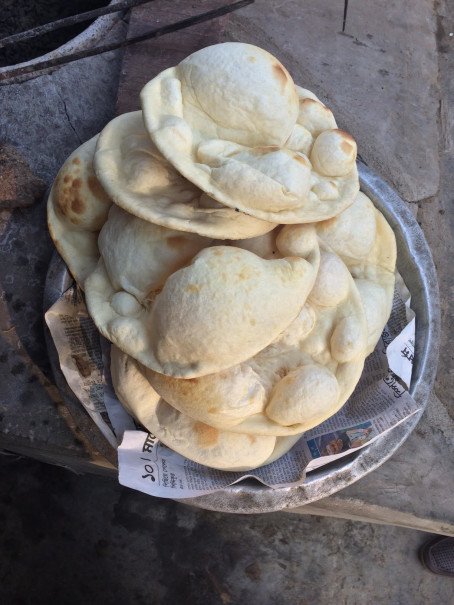
A Stranger at Home in a Strange Land

A Stranger at Home in a Strange Land
Naan in Dhaka
When I married into a Russian-Bangladeshi family based in Dhaka a few years ago, I feared we might not have much in common. My anxieties proved unfounded: at a minimum, we all share a deep fear of leaving the house hungry, even if we are only going to get breakfast. So we pre-game.
When my husband and I make our annual visit, we start the morning with an astringent, pinkish tea made from dried flowers that my in-laws call “Sudanese Rose,” but which is also called karkade, hibiscus, or, in the tribal hill country, tok—”sour” in Bangla. With the tea, we’ll snack on some slices of cheese, homemade olive and tamarind pickle, dry biscuits, and leftover salad dressed with lime and the pungent heat of mustard oil. The whole room is filled with the incense-like tang of mosquito coils burning in clay pots.
Dhaka’s 15+ million people are crammed into around 125 square miles, making it denser (and more exhausting) than almost any other city on earth. My in-laws moved past the edge of Dhaka after decades in the heart of the city, whose sprawl moves so rapidly that it seems to undulate.
The new digs mean we get to take a morning constitutional every day when we go for breakfast in a nearby village. We set out while the sun is still low, picking our way through a dusty construction site for an impressive 100-foot-wide road and then down a smaller road marked with farm plots of nascent rice shoots.
It’s still cool so I’m bundled in a sweater and down vest. Climate change has led to more extreme winters here in a place where many live in insufficient housing without any insulation or cold weather clothing; dozens of people routinely die of cold each year in a country where winters rarely go below 40F. People pass us in the road with their heads wrapped, toothache-style, in plaid scarves that seemingly half the country owns along with layer upon layer of insufficient t-shirts with improbable slogans from local factories (“Old is the New” “Party Time Pancakes”).
We arrive in the neighboring village—which consists of one narrow main drag of about twenty shops—and take low metal stools at a small, partially open-air roadside spot. Most Bangladeshis have simple rice for breakfast. We’re having a pricier but still typical option: parathas fresh from the griddle, a scallion egg omelet, daal, and a spiced vegetable mash. Instead of paratha, I opt for roti naan without oil or butter, hot from the clay oven. All of this is downed with multiple rounds of tea, always with condensed milk.
Bangladesh has fewer tourists than almost every other country on earth save hot spots like North Korea and Vanuatu. As a visitor and the very rare white guest ambling through their village on the outskirts of Dhaka, I’m a minor celebrity. The attentiveness of our waiter is intense; he flings the next puffed, browned naan right on top of the half-finished one I had begun just a moment earlier. Every few minutes, someone strolls by trying to seem quite busy doing something else while actually snapping a selfie with me somewhere in the frame. I speak pretty much two words of Bangla: “acha” (OK) and “dhonnobad” (thank you) so I basically just say that over and over again and smile broadly.
Each time I come to Dhaka I feel like I’m looking in at a different world I’ll never understand; each time, however, it begins to feel a bit more familiar as well, like how my breakfast order now rolls off my tongue.
Back home, my mother-in-law and I huddle in the kitchen with the two teenage girls who work for her, shelling an enormous, slouching sack of peas. We put on another pot of hibiscus tea.